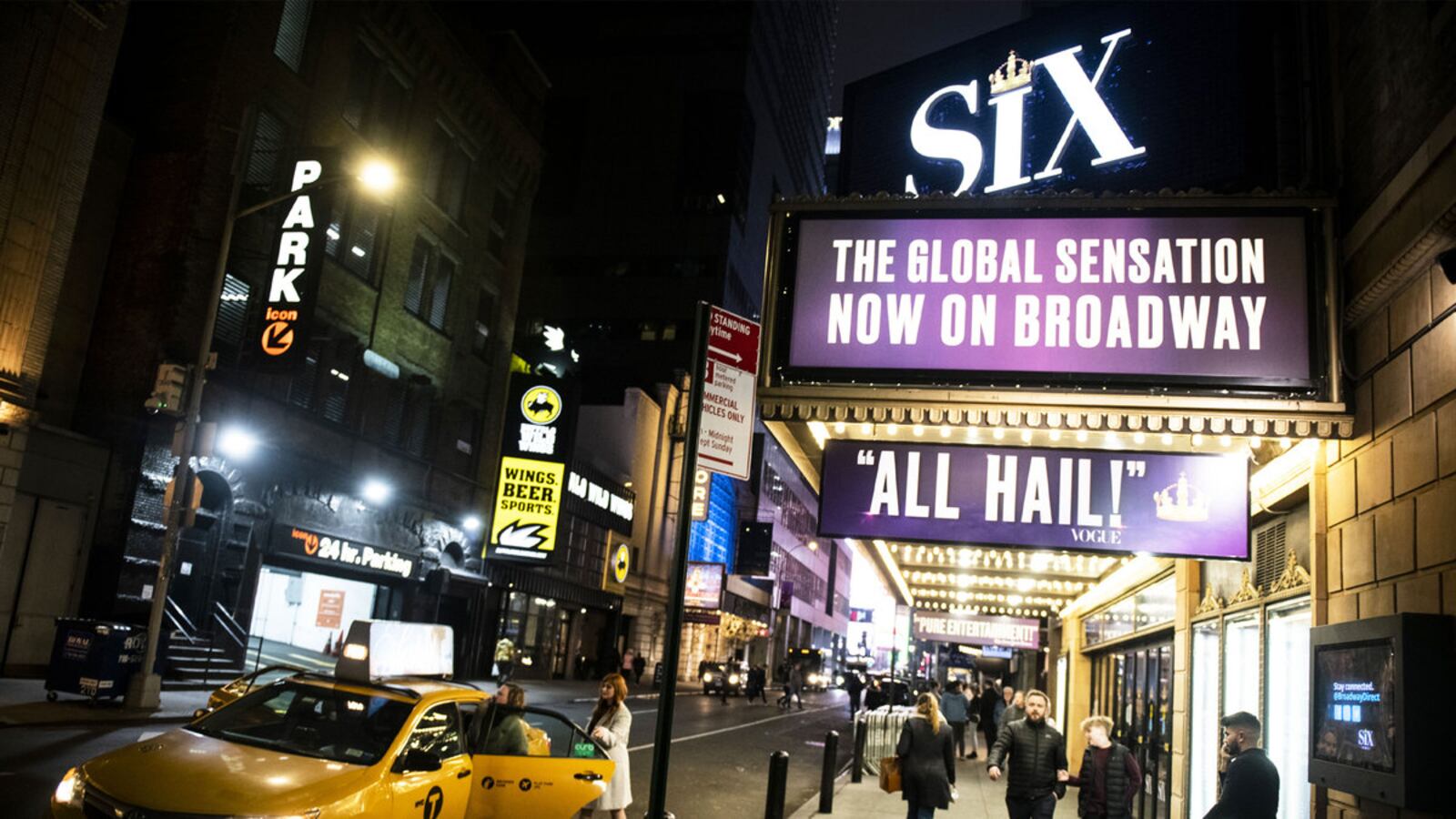On Thursday night, Broadway should have rung in the opening night of the much-buzzed-about musical, Six, about the six wives of Henry VIII. But Six did not open on Thursday night.
At least until the week of April 13, no theater shows will open on Broadway. As per New York Governor Andrew Cuomo’s coronavirus edict of Thursday afternoon, the Great White Way has gone dark. Gatherings of over 500 people are forbidden. The Tony Awards season has been thrown into likely disarray; a cavalcade of major Broadway openings—featuring stars like Patti LuPone (Company), Sarah Jessica Parker, and Matthew Broderick (Plaza Suite)—will now not open until at least mid-April. The rumors have begun about which shows will survive, and which will not.
“The atmosphere is funereal,” one senior Broadway producer, who requested anonymity, told The Daily Beast. “I read that Broadway is expected to lose $100 million. One part of me is heartbroken, but another part of me is really grateful we are doing this, because we need containment and we need to be honest about the situation. You have to put emotions aside, and realize what is the greater good. To contain coronavirus in the short term will benefit us all going forward.”
Ticket holders for performances before April 12 could potentially get refunds or exchanges for their tickets. “Our top priority has been and will continue to be the health and well-being of Broadway theatergoers and the thousands of people who work in the theatre industry every day, including actors, musicians, stagehands, ushers, and many other dedicated professionals,” Broadway League president Charlotte St. Martin said.
Broadway is a financial and cultural eco-system far beyond the bold-face names that make it into opening night reviews. It nourishes the finances of restaurants, bars, cafés, stores, and hotels. It is the beating heart of New York cultural life, and a major magnet for visitors. An integral part of New York City’s economy—last season worth $1.8 billion—is, momentarily at least, imperiled.
Mayor Bill de Blasio had said earlier in the day that he didn’t “want to see Broadway go dark if we can avoid it. I want to see if we can strike some kind of balance.” Later in the day, over-ruled by Cuomo, de Blasio declared a state of emergency in New York City.
“The shows that have been doing well and have a financial cushion will survive,” the Broadway producer told The Daily Beast. “But if shows haven’t being doing well, or if they haven’t yet built that audience and were waiting for the critics to see them in the coming month, they’re the ones in trouble.
“But listen, this is a pandemic—unprecedented. When everyone heard the news of that usher from the Booth (and Brooks Atkinson) who got infected, that was when it really hit home on Broadway. This shut down is awful, but it’s the right thing to do. Now, we just need to make sure everyone—performers, public, everyone—is as safe as possible.”
Indeed, pressure from members of unions like the Actors’ Equity Association, concerned for theirs and others’ safety, helped force lawmakers and the Broadway League to act on Thursday. Before Cuomo’s intervention, the League more than once refused to directly answer The Daily Beast’s questions about the public health grounds upon which it was keeping theaters open, and how it intended to safeguard the health of performers, workers, and the public.
In a statement on Thursday, Mary McColl, executive director of Actors’ Equity Association, the national labor union representing professional actors and stage managers in live theater, said its focus was now on protecting its members from financial hardship and ruin.
“Gov. Cuomo has made an important decision to protect the health and safety of everyone who works in the theatre,” said McColl. “Equity members are dedicated professionals who earn their health care and pensions one week of work at a time. Today’s decision means tremendous uncertainty for thousands who work in the arts, including the prospect of lost income, health insurance and retirement savings.”
“Equity will use all of our options to advocate for all our members and is engaged at all levels to ensure members are protected and paid. Now is the time for Congress and local governments to put workers first to ensure that everyone who works in the arts and entertainment sector has access to paid leave, health care and unemployment benefits. Payroll tax cuts won’t help those whose theaters are now dark. For every middle-class actor you see onstage, there are dozens of other workers behind the scenes and in an administrative capacity.”
“Decisions made now will impact many arts organizations and the communities they serve for months to come. Sustaining our entertainment sector and the workers who power it is essential. We must act, and quickly now, not only to protect public health, but with arts funding at all levels that ensures local arts employers have the resources they need to quickly recover and reopen. This will ensure the arts continue generating an economic halo effect in New York.”
On Thursday, the running tally of one major New York cultural institution after another closing temporarily—like the Metropolitan Museum of Art, the Metropolitan Opera, Carnegie Hall, New York Public Library, and Lincoln Center—obscured another tally of temporary closures of off-Broadway venues, like Signature Theatre, the Public, Classic Stage Company, and New York Theater Workshop.
Similar announcements came from theaters outside NYC like the Kennedy Center in Washington, the Center Theatre Group in LA, and venues in cities including Chicago, San Diego, and San Francisco. The effects of coronavirus-related cancellations may hit smaller venues and companies hardest.
The sub-economies built around Broadway, like restaurants and bars, are bracing for hard times.
Franco Lazzari, co-owner with partner Stefano Terzi of the popular Italian restaurant Vice Versa on 51st Street, told The Daily Beast that the Broadway shut down would be “a huge loss. You are not just losing the theater crowd, which is 50 percent of our business. But you are also losing all those people who are rightly anxious about a public health emergency. These people will not be coming out to eat and drink. People are working from home, and not going to their offices, so these people are not here either.”
Lazzari said that until last week it had been “business as usual. But with all the new coronavirus cases in New York this week, and more uncertainties things have changed. We are not as busy as we expect to be. From a business point of view we are expecting a gigantic loss. We are considering closing at lunchtimes, or maybe even shutting entirely for an entire week. It may be the best solution. I do not have a union to look after me. I am sure my landlord wants to be paid. I don’t know if insurance will cover our huge losses. The impact will be huge. Horrible.”
Chris Reilly, managing partner of the Glass House Tavern on 47th Street—a venue typically buzzing with Broadway’s full rainbow of actors, off-stage staff, local residents, and tourists—told The Daily Beast: “This is a difficult and worrisome time. We have not gone through anything like this before. We have to try and figure out the best way to keep everyone safe, all our staff safe, and try to have as normal life as we can. I can’t think of a segment of the population affected in anything but a negative way, except,” he laughed softly, “I.T. people setting up computers to help people work from home.”
Reilly said he hoped that banks would freeze payments on mortgages, and rent payments for businesses. “It’s always precarious for a small business. For Broadway to be shut for at least a month—or more, we don’t know—is difficult to deal with. We will do all we can to survive. Our employees’ safety is our prime concern, and we will try to get through this together. Once this is all under control, I hope we get out the other side.”







